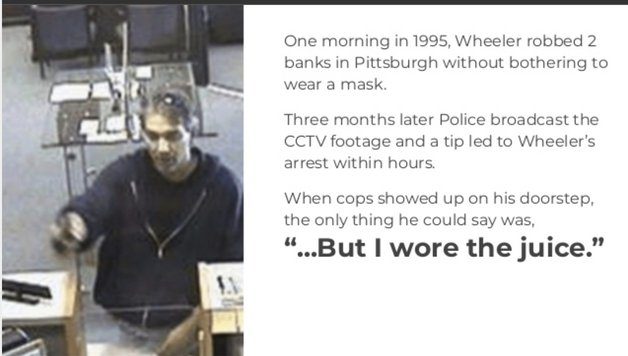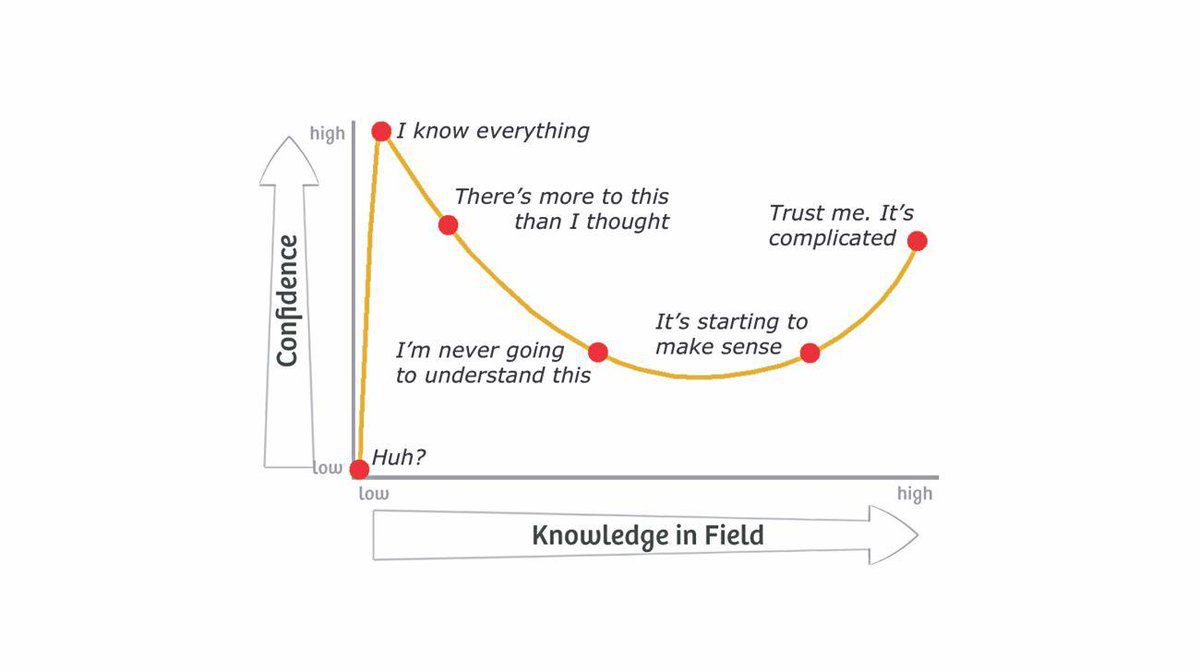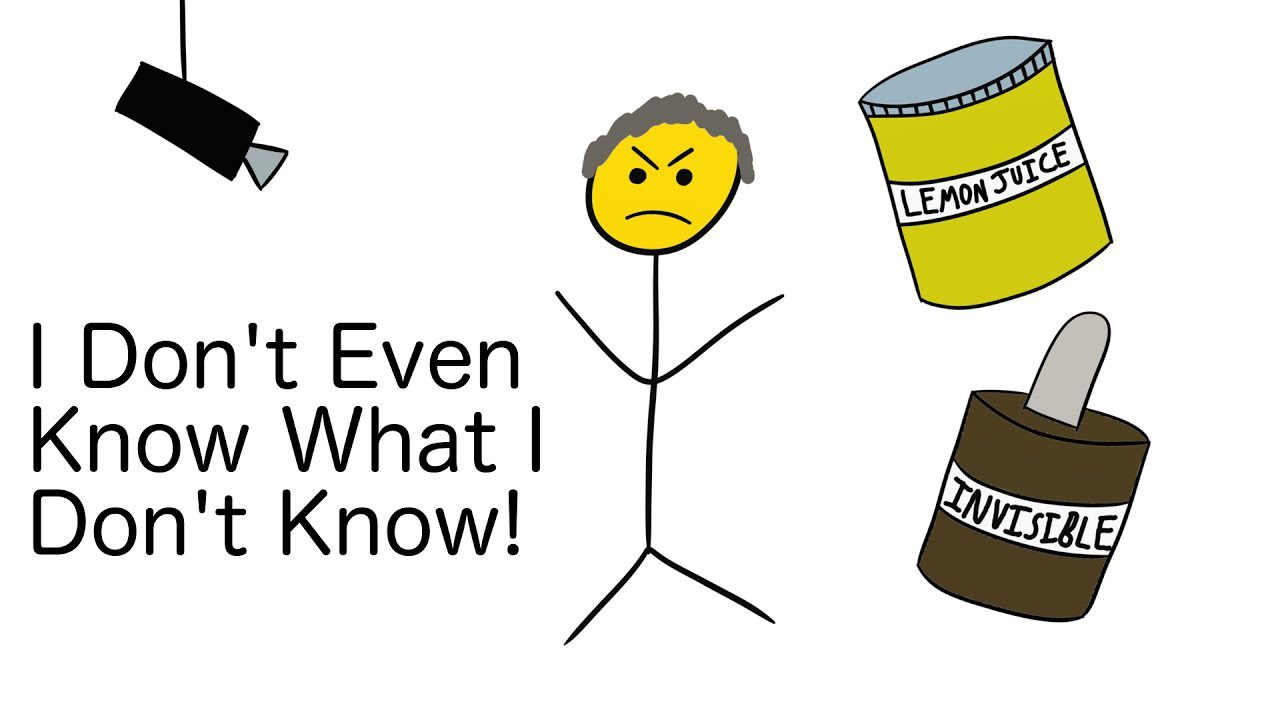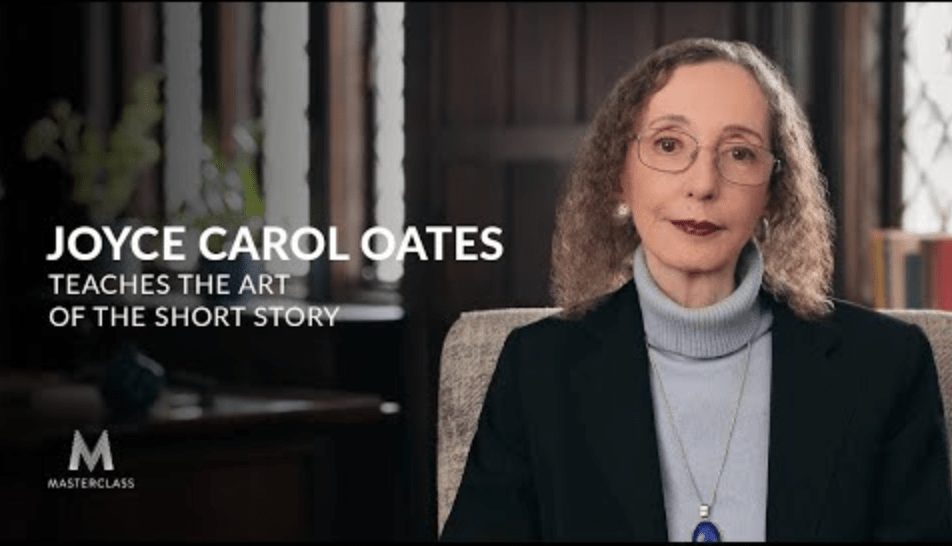The only true wisdom is in knowing you know nothing. – Socrates
The Dunning–Kruger effect is a cognitive bias in which people with low ability at a task overestimate their ability. It is related to the cognitive bias of illusory superiority and comes from the inability of people to recognize their lack of ability.
According to Social Psychologists, David Dunning and Justin Kruger, People tend to hold overly favorable views of their abilities in many social and intellectual domains. The bias results from an internal illusion in people of low ability and from an external misperception in people of high ability; that is,
The miscalibration of the incompetent stems from an error about the self, whereas the miscalibration of the highly competent stems from an error about others.
The authors suggest that this overestimation occurs, in part, because people who are unskilled in these domains suffer a dual burden: Not only do these people reach erroneous conclusions and make unfortunate choices, but their incompetence robs them of the metacognitive ability to realize it.
Across four studies, the authors found that participants scoring in the bottom quartile on tests of humor, grammar, and logic grossly overestimated their test performance and ability. Although their test scores put them in the 12th percentile, they estimated themselves to be in the 62nd. Several analyses linked this miscalibration to deficits in metacognitive skill, or the capacity to distinguish accuracy from error. Paradoxically, improving the skills of the participants, and thus increasing their metacognitive competence, helped them recognize the limitations of their abilities.
The average person suffers from three delusions: That he is a good driver, That he has a good sense of humor and That he is a good listener
In their 1999 study, “Unskilled and Unaware of It: How Difficulties in Recognizing One’s Own Incompetence Lead to Inflated Self-Assessments“, Dunning and Kruger’s identified the cognitive bias of illusory superiority in their research. The identification derived from the cognitive bias evident in the criminal case of McArthur Wheeler, who, on April 19, 1995, robbed two banks while his face was covered with lemon juice, which he believed would make it invisible to the surveillance cameras. This belief was based on his misunderstanding of the chemical properties of lemon juice as an invisible ink.

Wheeler was aware lemon juice could be used to create an invisible. He reasoned, if he rubbed lemon juice over his face, it would turn his face invisible as well.
In his Book, Self-Insight Roadblocks and Detours on the Path to Knowing Thyself (Essays in Social Psychology), David Dunning shares some further insights on our perceived illusory superiority:
A large number of studies from many corners of psychology research suggest that, as a general rule, people’s impressions of their abilities— whether arrogant or humble—are not anchored very closely to their actual level of skill. Across a large number of domains—from scholastic performance to leadership ability to clerical skills to professional knowledge— what people think about themselves can be quite distinct from the truth of their competence and expertise.

The dissociation between perception and reality can be found in real-world areas of some consequence. The views adolescent boys have of their knowledge about condom use correlates only slightly with their actual knowledge (Crosby & Yarber, 2001). Nurses’ estimates of their proficiency at basic life support tasks fail to correlate with their actual level of knowledge (Marteau, Johnston, Wynne, & Evans, 1989). Doctors’ beliefs about their understanding of thyroid disorders does not correspond at all to their actual level of understanding (Tracey, Arroll, Richmond, & Barham, 1997). Family practice residents’ views about their patient interviewing skills do not correlate highly (roughly .30) with what their instructors and other experts think (Stuart, Goldstein, & Snope, 1980).
Philosophers are people who know less and less about more and more, until they know nothing about everything. Scientists are people who know more and more about less and less, until they know everything about nothing.
― Konrad Lorenz
In sum, the notions people have about their skills and knowledge are far from perfect indicators of their actual proficiency. Those with the most vaulted beliefs of their competence are not necessarily the most competent; those who denigrate their skills are not necessarily the least skillful. Impressions of skill are somehow decoupled from reality—perhaps not completely, but to an extent that is surprising.
We tend to overestimate a lot:
- Workers tend to think their absentee record is better than the typical employee in their workplace (Harrison & Shaffer, 1994).
- People think they are less susceptible to the flu than the average person (Larwood, 1978).
- Motorcyclists think they are less likely to cause an accident than other bikers (Rutter, Quine, & Albery, 1998).
- Elderly drivers tend to think they are better drivers than other individuals their age (Marottoli & Richardson, 1998).
- Business executives think their firm is more likely to succeed than the typical firm in their business sector (Cooper, Woo, & Dunkelberg, 1988; Larwood & Whittaker, 1977).
- Grocery store cashiers think they are much better than their peers at spotting which young-looking customers should be “carded” for alcohol (McCall & Nattrass, 2001).
- Bungee jumpers think they are less likely to meet harm than will the typical bungee jumper, a perception, by the way, that is not shared by their friends and family (Middleton, Harris, & Surman, 1996).
- Surgical trainees overestimate the accuracy of their diagnoses after looking at x-rays of possible radial fractures (Oksam, Kingma, & Klasen, 2000).
- Clinical psychologists do the same in their inferences about a client after reading case study materials (Oskamp, 1965).
Other work shows that people remain overconfident even when, it could be argued, they should know better.
- Students whose parents were married and divorced several times are the most confident among their peers that their future marriages will be stable and long-lived (Boyer-Pennington, Pennington, & Spink, 2001).
- Despite the fact that people know in the past that they typically have had to scramble to get some task done before a deadline, be it a class assignment or their income tax return, they continue to believe that they will complete the task well before the deadline (Buehler, Griffin, & MacDonald, 1997; Buehler, Griffin, & Ross, 1994).
There are systematic circumstances in which people show little overconfidence, or sometimes even unwarranted underconfidence.
- If the task at hand is particularly easy and performance is high, people tend to be underconfident in their performance (Lichtenstein & Fischhoff, 1980).
- If people think they are horrific at a task, such as computer programming, they exaggerate how bad they are to an unrealistic degree (Kruger, 1999).
Ignorance more frequently begets confidence than does knowledge: it is those who know little, not those who know much, who so positively assert that this or that problem will never be solved by science. – Charles Darwin
Anosognosia
In 1914, Babinski coined the term now used, anosognosia, to describe these cases in which people are physically or neurologically impaired, sometimes grossly, yet fail to recognize the depth or even the existence of their impairment (Redlich & Dorsey, 1945).
According to Dunning, It is not that people performing poorly fail to recognize their incompetence. Instead, our argument is that people performing poorly cannot be expected to recognize their ineptitude.
They are simply not in a position to know that they are doing badly. The ability to recognize the depth of their inadequacies is beyond them. Much like certain types of brain damage prevent sufferers from recognizing their blindness or paralysis, incompetence places people in a state of anosognosia that makes it very difficult, and at times impossible, for sufferers to to gain insight into how impaired their intellectual and social skills are.
The reason incompetent individuals cannot be expected to recognize their deficits is that they are doubly cursed: In many areas of life, the skills necessary to produce competent responses to the outside world are also the exact same skills needed to recognize whether one acted competently.
Consider the skill of constructing a logically sound argument. To produce a sound argument, one needs adequate knowledge of the sometimes subtle and tricky rules of logic. One has to know what a logical argument looks like and know how to avoid the common pitfalls into which people stumble. But now consider the task of judging the soundness of an argument. To be an adequate judge, one once again needs to possess a comprehensive and nuanced knowledge of the rules of logical reasoning. The act of judging the logic of an argument draws on the very same skills as the act of producing an argument.
In the Contranian’s Guide to Leadership, Steven B. Sample wrote:
The average person suffers from three delusions:
- That he is a good driver
- That he has a good sense of humor
- That he is a good listener
All the best in your quest to get better. Don’t Settle: Live with Passion.



1 Comment
Pingback: The Lake Wobegon Effect. | Lanre Dahunsi